
Guests
- Gershon BaskinMiddle East director of the International Communities Organization, a human rights advocacy group. In 2011, he helped to negotiate the release of Israeli soldier Gilad Shalit from Hamas captivity in exchange for the release of 1,027 Palestinian prisoners.
According to the latest update from the Israeli military, Hamas is still holding at least 229 hostages captured during its October 7 incursion into southern Israel. The group has stated that they will not release all hostages until Israel agrees to a ceasefire in Gaza. To discuss the release thus far of four hostages and prospects for future releases, we speak to Gershon Baskin, who helped negotiate a critical hostage exchange between Israel and Hamas in 2011. “I really think this is some kind of negotiating game and competition that exists featuring Qatar and Egypt,” says Baskin.
Transcript
AMY GOODMAN: This is Democracy Now!, democracynow.org, The War and Peace Report. I’m Amy Goodman.
The Israeli military has announced it now believes 229 hostages are being held by Hamas and other militant groups in Gaza. The hostages were seized on October 7th, when Hamas carried out a shocking attack that Israel says killed about 1,400 people. Hamas has released four hostages so far. On Thursday, Hamas officials claimed the Israeli bombardment of Gaza has already killed 50 of the hostages, but the group did not provide any evidence to back up this claim. A Hamas official who’s part of a delegation visiting Moscow says the group will not release any more hostages until Israel halts the airstrikes.
Meanwhile, families of the hostages continue to call for their loved ones to be safely returned. This is Hadas Calderon in Tel Aviv.
HADAS CALDERON: Five members of my family have been kidnapped — five — my mom, my niece, two children, Erez, Sahar, and their father, Ofer. A week ago, I was announced — I got information that my mom and my niece been murdered. I didn’t even have time to grieve and to go to the funeral. Today, a week after, I went up to the grave. So today I was crying and grieving, and now I’m celebrating. You know, it’s a surrealistic situation. … We are celebrating my son Erez. He’s 12 years old today. We’re celebrating his birthday. He loves the mountain bike, and his father also is very professional in riding bike. So, that’s what you see. And I wish he could be here to enjoy with everybody and to feel like a normal boy.
AMY GOODMAN: We’re joined now in Jerusalem by Gershon Baskin. He is Middle East director of the International Communities Organization, a human rights advocacy group. In 2011, he helped negotiate the release of the Israeli soldier Gilad Shalit from Hamas captivity after five years, in exchange for the release of 1,027 Palestinian prisoners. His memoir is called In Pursuit of Peace in Israel and Palestine.
Welcome back to Democracy Now!, Gershon Baskin. If you can say what you think needs to happen right now?
GERSHON BASKIN: What needs to happen is what Hamas spoke about already two weeks ago, which is a release of what they call the civilian hostages in exchange for an immediate ceasefire. That’s what Hamas has been saying since yesterday. And yesterday, there was a change of tone from Mousa Abu Marzook. He’s the Hamas official who went to Moscow. I communicated with Dr. Mousa Abu Marzook yesterday, who for the first time said, “There needs to be a ceasefire first, and then we’ll talk about the hostages.”
Right now Hamas is holding women, children, elderly people, wounded and sick people, who it’s obviously against international humanitarian law to hold them, to abduct them, to kill them. It’s also against Islam. It’s against their own beliefs in the Qur’an to take women and children and elderly people as hostages.
I think that Israel is prepared to grant a ceasefire to stop the bombardment of Gaza and to enable civilian hostages to come home. We have to be clear also who we’re talking about, because, for Hamas, every Israeli is a soldier. So it needs to be defined who they are talking about when they’re talking about civilians.
But there’s a big complication here, because Hamas is probably not holding all the hostages. The Hamas political leadership, which is scattered between Gaza, Beirut and Doha, is not in charge of the hostages, and it’s not clear that when they make an obligation, say, to the Qatari government that they’re willing to negotiate some kind of deal, that they are actually able to implement the deal. There’s a big question about it, of who is talking to the people who have control of the hostages and whether or not Hamas at all has control of all the hostages, because some were taken by Islamic Jihad, some by PFLP, and some by individuals who are holding hostages.
AMY GOODMAN: Talk about your back channels, Gershon, to Hamas, to Egypt and to Qatar.
GERSHON BASKIN: I’ve been talking to everyone. I’ve been talking to Hamas people in Gaza, in Qatar and in Beirut. It’s a very difficult conversation. And my assessment today, three weeks into this war, is that they don’t have a coherent strategy. They’re not all giving the same messages. And as said, I’m not sure that they even have control. The Qataris were talking quite a lot, wanted direct contact with the Israelis. Myself and a colleague who was in Rome put them in direct contact with the Israelis. It’s not sure who they’re talking to on the Israeli side, and if the people that are talking to the Israeli side are actually sitting in the war cabinet making the decisions.
It seems that the side with the best contact are the Egyptians. And the Egyptians were responsible for releasing the second two women, who are Israelis without second passports. They’re Israeli Israelis, members of a kibbutz along the Gaza border. One of them has been a peace activist and a volunteer driver of sick Palestinian children from Gaza to Israeli hospitals for years. And it seems that they were released as a result of Egyptian pressure on al-Qassam, on the military wing of Hamas.
AMY GOODMAN: That was Yocheved Lifshitz, who also spoke to the press after she was released.
GERSHON BASKIN: That’s right.
AMY GOODMAN: Her husband is still in, also well known as a peace activist who went to the border crossing repeatedly to help Palestinians, and especially those who were having medical problems.
GERSHON BASKIN: That’s right.
AMY GOODMAN: So, how did the first two hostages get released? And do you see anything large happening now?
GERSHON BASKIN: So, I think my understanding of what happened with the two sets of women who were released is that the first one was a result of direct pressure of President Biden and Secretary Blinken on the Qatari government, who applied pressure on the political leadership of Hamas, who is hosted in Qatar. And President Biden mentioned their names specifically. They’re American citizens who live in Chicago. I believe that the second set of the two women who were released was a result of the Egyptians wanting to show that they could do better than Qatar in releasing two elderly women who are full Israeli citizens without another passport. The Israelis weren’t involved in either releases at all. They had no part of it. And Israel didn’t pay anything for those releases. I really think this is some kind of negotiating game and competition that exists between Qatar and Egypt.
I think that the Israelis are holding off on the ground incursion of thousands of Israeli troops, tanks and artillery and special forces in order to exhaust every possibility to bring out as many hostages through negotiations. This seems to me the reason why the Israeli delay on the incursions. In the meantime, Israel is going in with small forces. For two nights now they’ve done this to, I think, assess the situation on the ground, to take care of specific intelligence information they have about Hamas battle plans once the incursion begins, and probably with special forces to see if they can find any of the hostages.
AMY GOODMAN: And how important is U.S. pressure on them to delay the invasion or to stop it altogether? And do you see the U.S. putting that kind of pressure? Originally, President Biden said he was not telling Netanyahu to use any kind of restraint.
GERSHON BASKIN: Right. So, Israelis and others, Americans, have said that the Americans are encouraging Israel to wait and to exhaust every possibility for negotiations, to wait with the ground operation. I think it has been influential.
But there are more and more voices in Israel who are calling to the Israeli government to recognize their moral responsibility to the hostages, because the number one function and responsibility of any state is to protect its citizens. And Israel clearly failed to protect the civilians who live along the Gaza border, and enabled them to be murdered and to be taken hostage. So there are calls, significant calls, from Israelis — not like me on the left, but from the center of Israel society, from the national security establishment, who are saying that Israel first has a responsibility to bring home the hostages. There are even several of them, including a former head of the Mossad, who said that Israel should even empty out all of its prisons and send all the Palestinian prisoners to Gaza in exchange for all the hostages being released. I can’t see that happening. But I think that there is more time, although not a lot, for a negotiated agreement for a release of the civilian hostages.
I think it’s important to note that the American government is and should be placing pressure on Qatar. Qatar has been the host of the Hamas leadership for many years. It has funded Hamas with more than a billion dollars over the years. And Qatar, if it doesn’t comply with American demands to put pressure on Hamas — Qatar should threaten the Hamas leadership that if they don’t comply, if they don’t pressure their own people back in Gaza, that they will be exiled from their welcome stay in Qatar. And Qatar, by hosting Hamas, is, in a way, a state that’s supporting terrorism.
AMY GOODMAN: Gershon Baskin, I wanted to ask you about a number of the hostage families and families of those Israelis who Hamas killed on October 7th, like Hayim Katsman, who was a University of Washington graduate student, came back to the kibbutz. He was trying to protect others. He was in a closet, and he was killed. We spoke both to his Seattle rabbi, where he was a Hebrew school teacher in Seattle, and his brother Noy, who is in Vienna, in Austria. Both called for an end to the occupation and said the invasion is not the answer to what has happened. Your final thoughts on what needs to happen now?
GERSHON BASKIN: I hope that after the Israeli people are experiencing the biggest trauma since the Holocaust, and the Palestinians have been taken back to 1948 and the Nakba, that we wake up from this traumatic situation and understand, first, the Israelis, that to delude ourselves that we can occupy another people for 56 years and have peace is simply not real, or that we can lock 2 million people in an open-air prison for 17 years and expect to have quiet is living in an imaginary world of delusion. I hope that the Palestinian people wake up and understand that they will never have peace if they don’t recognize the Jewish people’s right to live in the land of Israel as well as their right to live in the land of Palestine, and that when this ends — I call it the day after tomorrow, because tomorrow is too soon. But the day after tomorrow, I’ve been calling for what — the metaphor I use is the Belfast moment, the moment when we stand up and say, “We’ve been killing each other for a hundred years, and we have to stop.”
Our leaders need to pay the price for bringing us here, Israeli leaders and Palestinian leaders. They all need to go. And we need a new generation of Israelis and Palestinians who are willing to stand up with new ideas, new visions, new hopes, new dreams, and the ability to lead us forward on the very basic principle that everyone living between the Jordan River and the Mediterranean Sea must have the same right to the same rights. That is the basic principle from which we have to start. And from there, we can decide if we want one state, two states, three states or 10 states, a federation or a confederation. But it begins with the mutual recognition that we all must have the same right to the same rights.
AMY GOODMAN: Gershon Baskin is Middle East director of the International Communities Organization, a human rights advocacy group. In 2011, he helped negotiate the release of the Israeli soldier Gilad Shalit from Hamas captivity in exchange for more than a thousand Palestinian prisoners. His memoir is titled In Pursuit of Peace in Israel and Palestine.
Next up, we speak to New York University Law School student Ryna Workman, who lost her job at a prestigious law firm — lost their job at a prestigious law firm after speaking up for Palestinian rights. Back in 20 seconds.

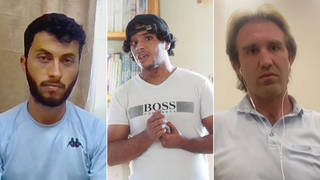
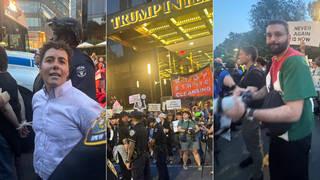

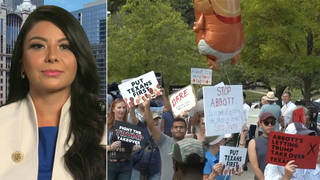





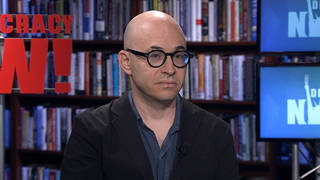

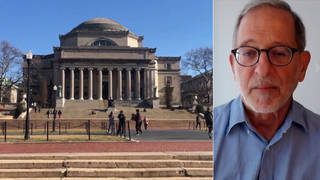
Media Options